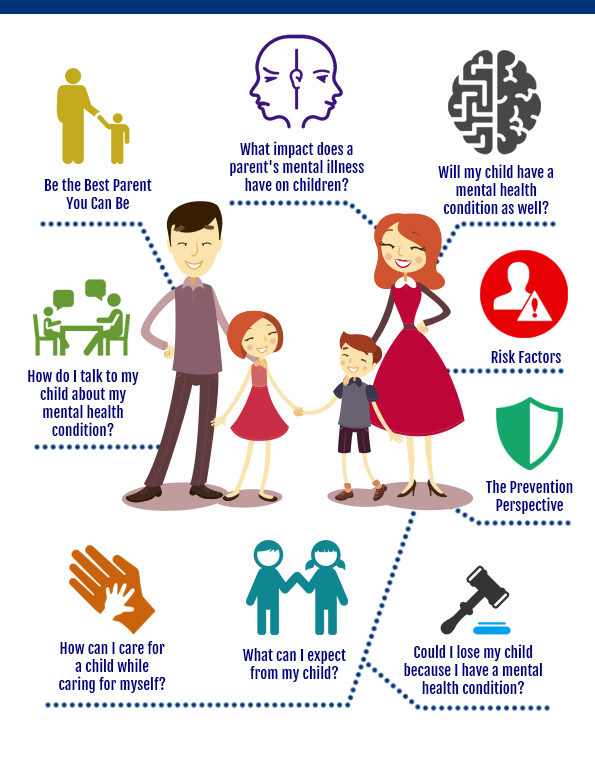Parenting with Mental Illness
The honest truth is that parenting is a challenging task. Needless to say that parenting with a metal illness is even more challenging. Many people worry that it will be difficult to cope with parenting if they have a mental health problem. Concerns about the potential impact on you and your children is natural. With the right support and resources, it is perfectly possible to be a good parent while managing a mental health problem, and to care for and support your children in a positive way.
 In addition to the many concerns you may have surrounding your mental illness and your family, there are a lot of emotions that may come into play for your child. It is important that you identify and address these issues.
In addition to the many concerns you may have surrounding your mental illness and your family, there are a lot of emotions that may come into play for your child. It is important that you identify and address these issues.
(excerpt from:Mental Health America)
- Anger– Your child may be angry at you for having a mental health condition. The child may think that it was your fault that you had a mental health condition and that it is your fault that they will experience a harder life. Your child might also be angry at external forces, such as a higher power or the world, for unfairly hurting you or your family. Your child may also be angry at him or herself. If you notice anger problems in your child, you should talk to your therapist or doctor about arranging for your child to join in sessions.
- Fear– Your child might be scared about what the future will bring. Your child might be afraid about how your mental health condition will change your relationship. They might be afraid about your ability to take care of them. Your child may also be scared about what others will think if they found out that you have a mental health condition. Sit down and talk to your child about these issues, reassure them you still love them.
- Guilt– Your child may blame himself or herself for your mental health condition, especially in cases or anxiety or depression. Your child may express guilt by taking over an inordinate amount of household duties. Your child may try and hide his or her own problems so as not to make your life any worse.
- Shame– Despite efforts to educate the public about mental illness, mental illness is still often a stigmatized and misunderstood condition. Your child might be embarrassed. He or she might think that your condition will have negative impacts on his or her social life and might be worried.
- Other potential emotional responses from you children include: Sadness, Anxiety, Relief, and Supportiveness.
- ( see http://www.mentalhealthamerica.net/parenting for a more info)
Parenting is both greatly rewarding and a daunting task for anyone. Mental illness is a challenge that many parents overcome with proper support. If you don’t have one develop a crisis action plan or a psychiatric advance directive, and designate someone to help with your parenting duties. If your child is old enough, you should discuss your plan with your child and identify resources and options together for handling things when you are not well.

